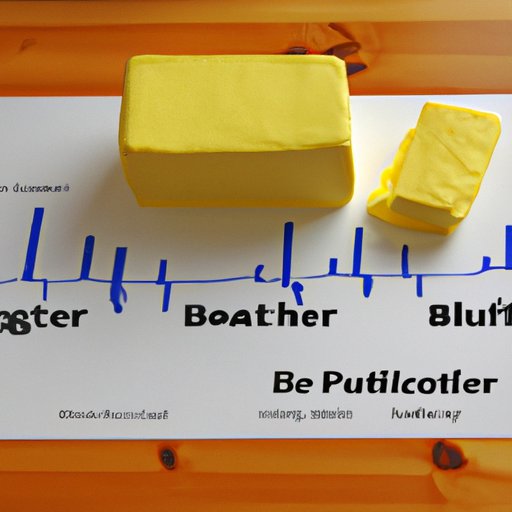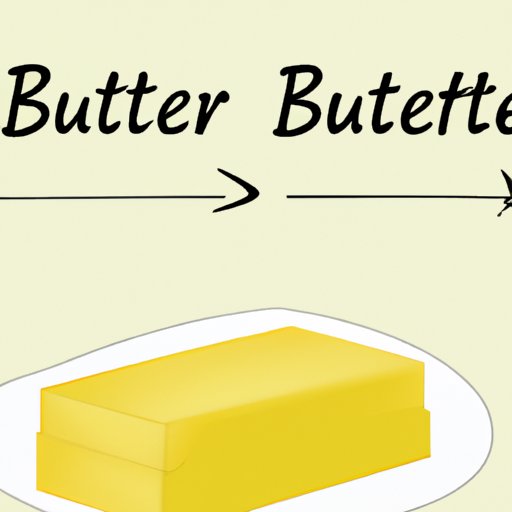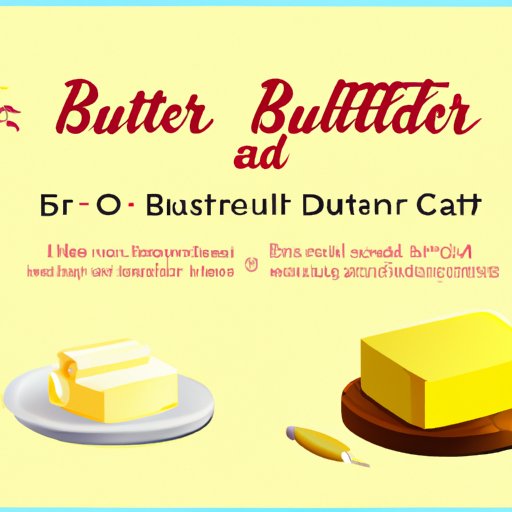Introduction
Butter is a dairy product made from churning cream until it thickens into a semi-solid, spreadable form. It has been used as a cooking ingredient for centuries and is a staple in many cultures around the world. But is butter healthy for you? This article will explore the potential health benefits and risks associated with butter consumption.
It’s important to note that butter is high in fat, calories, and cholesterol, making it a source of dietary concern for some people. However, it also provides essential nutrients like vitamins A, D, and E, along with beneficial fatty acids like conjugated linoleic acid (CLA). To better understand the impact of butter on health, it’s important to look at both the nutrition profile of butter and the latest research on butter and health.
Examining the Nutritional Profile of Butter
Butter is primarily composed of saturated fat and cholesterol, although it also contains small amounts of unsaturated fats, protein, and carbohydrates. On average, one tablespoon (14 grams) of butter contains 102 calories, 11.5 grams of fat, 7.3 grams of saturated fat, and 31 milligrams of cholesterol.
In addition to these macronutrients, butter also contains trace amounts of several micronutrients, including vitamin A (1% of the Daily Value), vitamin D (3%), vitamin E (2%), and selenium (4%). Butter also contains small amounts of calcium, phosphorus, magnesium, and potassium.

Exploring the Role of Butter in a Healthy Diet
The Dietary Guidelines for Americans recommend limiting saturated fat intake to less than 10% of total daily calories. This means that if you follow a 2,000 calorie diet, you should aim to consume less than 22 grams of saturated fat per day. One tablespoon of butter contains 7.3 grams of saturated fat, so it’s important to be mindful of how much butter you’re consuming.
It’s also important to consider the types of fats that you’re eating. The Dietary Guidelines recommend replacing saturated fats with monounsaturated and polyunsaturated fats, which are found in foods like olive oil, nuts, seeds, and certain fish. These healthier fats can help reduce your risk of heart disease and other chronic health conditions.

Investigating the Health Benefits Associated with Butter Consumption
Although butter is high in saturated fat, there is some evidence that it may have beneficial effects on health. For example, several studies have found that butter consumption is not associated with an increased risk of cardiovascular disease or stroke. In fact, some studies suggest that it may even be protective against heart disease.
There is also some evidence that butter may help with weight loss. A recent study found that replacing refined carbohydrates with butter was associated with greater weight loss over a 16-week period. This could be due to the fact that butter is more satiating than other sources of fat, helping you feel fuller for longer.
Finally, butter may also have a positive effect on gut health. Butter contains butyrate, a short-chain fatty acid that acts as a prebiotic, helping to feed beneficial bacteria in the gut. Higher levels of beneficial bacteria are associated with improved gut health and a lower risk of chronic diseases.

Evaluating the Potential Risks of Eating Butter
Despite the potential health benefits associated with butter consumption, it’s important to remember that it is still high in saturated fat. Eating too much saturated fat increases your risk of developing high cholesterol and type 2 diabetes. Therefore, it’s important to limit your consumption of butter and opt for healthier sources of fat, such as olive oil, nuts, and avocado.
A Comparison of Different Types of Butter
When considering butter consumption, it’s important to think about the type of butter you’re eating. Grass-fed butter is higher in beneficial fatty acids like CLA, while organic butter is free from synthetic pesticides and hormones. Conventional butter is typically produced from pasteurized milk and contains fewer beneficial fatty acids.
It’s also important to note that organic and grass-fed butter tend to be higher in calories and fat than conventional butter. Therefore, when choosing a type of butter, it’s important to consider the nutritional content and impact on health.
Analyzing the Latest Research on Butter and Health
Recent research has explored the potential health benefits and risks associated with butter consumption. While some studies suggest that butter may provide protective benefits against heart disease and diabetes, other studies have linked it to an increased risk of obesity and metabolic syndrome.
Overall, the evidence is mixed and more research is needed to fully understand the impact of butter on health. It’s important to remember that butter is high in saturated fat and should be consumed in moderation as part of a balanced diet.
Conclusion
In conclusion, butter is high in saturated fat and calories and should be consumed in moderation. Although it may provide some health benefits, such as protection against heart disease and improved gut health, it can also increase your risk of developing type 2 diabetes and obesity. When choosing a type of butter, it’s important to consider the nutritional content and impact on health.
Ultimately, the best way to enjoy butter is to do so in moderation and to focus on eating a balanced diet that includes plenty of fruits, vegetables, whole grains, and lean proteins. By following these guidelines, you can ensure that butter consumption is part of a healthy lifestyle.
(Note: Is this article not meeting your expectations? Do you have knowledge or insights to share? Unlock new opportunities and expand your reach by joining our authors team. Click Registration to join us and share your expertise with our readers.)
